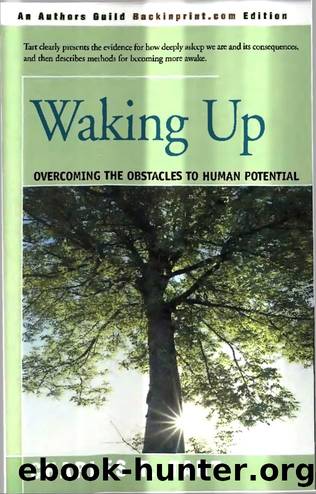Waking Up by Charles T. Tart

Author:Charles T. Tart
Language: eng
Format: epub
False Personality and Essence
This chapter will be a brief summing up of the problems of consensus trance that we have looked at in this section. We will be looking in more detail at the concepts of personality, false personality, and essence.
In the Introduction to this book I spoke of the loss of our vital energies as the loss of the light that we once saw, but now can see no more, using the first two verses of Wordsworthâs âIntimations of Immortality.â Let us return to that theme with the first two verses of Stephen Spenderâs âI Think Continually of Those Who Were Truly Great.â
I think continually of those who were truly great.
Who, from the womb, remembered the soulâs history Through corridors of light where the hours are suns,
Endless and singing. Whose lovely ambition Was that their lips, still touched with fire,
Should tell of the Spirit, clothed from head to foot in song.
And who hoarded from the Spring branches The desires falling across their bodies like blossoms.
What is precious, is never to forget
The essential delight of the blood drawn from ageless springs Breaking through rocks in worlds before our earth.
Never to deny its pleasure in the morning simple light Nor its grave evening demand for love.
Never to allow gradually the traffic to smother With noise and fog, the flowering of the Spirit.1
PERSONALITY
The study of personality is one of the major areas of specialization in modern psychologyâI specialized in it in my graduate trainingâand a
False Personality and Essence *163
fascinating subject for almost everyone. Do I have a good personality or a bad one? Should I take a course in improving my personality?
By personality we usually mean an enduring and persisting set of attitudes, traits, motivations, beliefs, and response patterns that characterize an individual and distinguish him or her from others. The term personality is usually equivalent to self in everyday usage. âJohn is aggressiveâ and âJohn has an aggressive personalityâ are used interchangeably. From the inside, your personality is usually considered your ultimate identity: âI am a person who is against crime in the streets, is sympathetic, is motivated to succeed in business, believes in the Constitution, and responds coolly in emergencies,â for example.
We value, defend, and cling to our personality, even when it has characteristics that cause suffering. The characteristics of our personality do set us up for suffering. If your personality is âmoral,â for example, then you can feel deeply hurt if someone accuses you of being âsinfulâ or âhypocritical.â Personality traits that obviously create suffering, such as feeling fearful in situations that donât bother most people, are seen as qualities to correct by replacing them with a more valued trait of personality, not as phenomena that question the whole idea of personality. Indeed, we value âstrongâ personalities, people with very powerful or flamboyant characteristics. On radio and TV, the guest on a show is referred to as a âpersonality.â Wouldnât it be wonderful if you could be a personality?
Modern psychology has recognized that for some people the overall structure
Download
This site does not store any files on its server. We only index and link to content provided by other sites. Please contact the content providers to delete copyright contents if any and email us, we'll remove relevant links or contents immediately.
Becoming Supernatural by Dr. Joe Dispenza(7105)
Tools of Titans by Timothy Ferriss(6945)
The Witchcraft of Salem Village by Shirley Jackson(6584)
Inner Engineering: A Yogi's Guide to Joy by Sadhguru(5894)
The Four Agreements by Don Miguel Ruiz(5510)
The Power of Now: A Guide to Spiritual Enlightenment by Eckhart Tolle(4754)
The Wisdom of Sundays by Oprah Winfrey(4626)
Room 212 by Kate Stewart(4105)
Fear by Osho(4085)
Pale Blue Dot by Carl Sagan(4001)
The David Icke Guide to the Global Conspiracy (and how to end it) by David Icke(3881)
Rising Strong by Brene Brown(3780)
Animal Frequency by Melissa Alvarez(3755)
How to Change Your Mind by Michael Pollan(3676)
Sigil Witchery by Laura Tempest Zakroff(3651)
Real Magic by Dean Radin PhD(3568)
Secrets of Antigravity Propulsion: Tesla, UFOs, and Classified Aerospace Technology by Ph.D. Paul A. Laviolette(3445)
The Art of Happiness by The Dalai Lama(3382)
Man and His Symbols by Carl Gustav Jung(3315)
